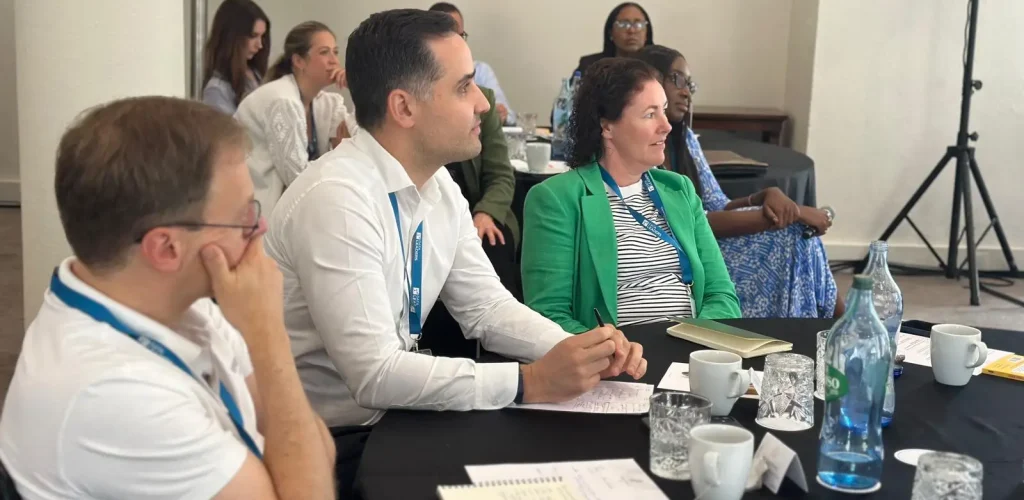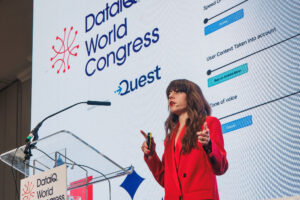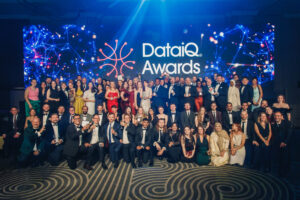During a post-Guild coffee talk hosted by Dael Williamson, EMEA CTO at Guild’s strategic partner, Databricks, this dynamic was described perfectly by Volker Buscher, CDO and Senior Advisor, DataIQ:
“Right now, we’re seeing rockets going off all over the business—but it’s not going to scale easily.”
It was a conversation that cut to the core of a challenge that still resonates in 2025: how can CDAOs enable innovation while avoiding chaos? What does strategic AI governance look like in a world that celebrates speed, decentralisation, and experimentation?
And how do data leaders stay credible when it feels like they’re not in control? It’s a topic we started to unpack in Voice of the CDO 2024 and will closely examine at Guild 2025.
Less control. More synchronised autonomy.
Let’s be honest: data and AI leaders didn’t ask for a flood of AI pilots. They mostly emerged organically—through experimentation, curiosity, and business teams trying to solve real problems. That’s not inherently bad. But without visibility and coordination, these pockets of activity quickly become fragmented, redundant, or even risky.
“I used to run rogue experiments too,” Volker admitted. “We gave them names like Project Beckenbauer so the CIO wouldn’t spot them.”
Jokes aside, the point is a serious one: fragmentation feels fast—until it becomes a blocker to value.
This is where the concept of synchronised autonomy becomes essential. It’s not about centralised command-and-control. It’s about ensuring that experimentation at the edge can align with enterprise-wide value creation.
“AI at scale needs a guiding mind, a person who can deal with these complexities and help the organisation to navigate through them,” said Volker, “Without it, you’ll feel like you’re swimming against the current and you’ll wear out before you generate value.”
Governance Is strategy. Culture is infrastructure.
It’s both a technology problem and a leadership one.
“Some data leaders are surprised by the attention they’re now getting,” Volker observed. “But they also need to ask themselves—am I ready for this moment?”
To be effective, CDAOs must operate across three domains:
- Architecture – ensuring the right data infrastructure exists to support experimentation and scale.
- Governance – not just compliance, but intentional decision-making about where and how to invest in AI.
- Culture – helping teams understand that fast doesn’t mean siloed, and experimentation doesn’t mean isolation.
As Dael noted, this moment requires technical leaders to step into organisational design roles:
“If your AI and your data are separate, the only use cases you’ll ever build are static—and the business is dynamic by nature.”
The CDAO as enabler of AI-first thinking
There’s a lot of pressure right now to show AI progress. Boards are asking. So are investors. But speed without direction leads to misalignment—and missed opportunity.
The most effective CDAOs today are not saying “no” to GenAI enthusiasm. They’re saying:
Yes—and let’s connect it to the bigger picture.
They’re mapping the business relationships, the value flows, and the operational models that allow intelligent experimentation without organisational entropy. And they’re stepping up as strategic enablers, not gatekeepers.
This is exactly the conversation that will unfold at Guild 2025.
We’ll explore how leaders are coordinating AI investments, building cross-functional trust, and creating systems that scale value—not just noise.
Specifically, we’ll be exploring:
The ascent of CDAOs into business leadership: how CDAOs are turning uncertainty into strategic advantage with data and AI, reshaping roles and building key partnerships.
Creating an AI-first organisation: the urgency for CDAOs to embed AI at scale and drive their organisations towards sustainable, enterprise-wide value.
Architecting value – the strategic catalyst: how CDAOs are focusing on demonstrating tangible value, proving themselves as strategic partners by aligning data and AI capabilities to organisational goals.
Interested in joining the conversation?
Guild is an invitation-only event for senior data and AI leaders. This year, it takes place from 17th to 19th June in Brihuega, just outside of Madrid, Spain.
If you’d like to contribute your voice and experience to this unique think tank, register your interest here.





